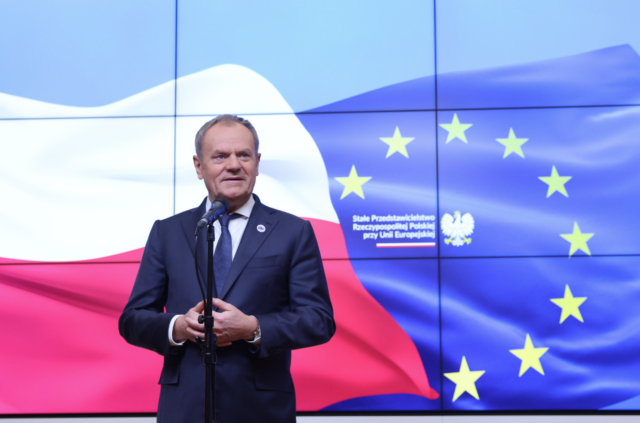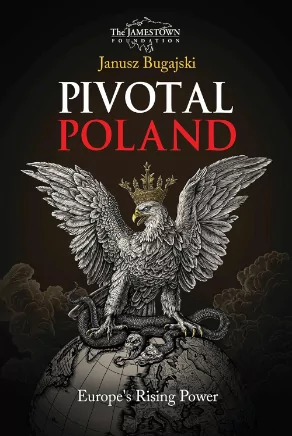
Poland Seeks More Effective Regional Formats as the Visegrád Group Fractures
Publication: Eurasia Daily Monitor Volume: 22 Issue: 2
By:

Executive Summary:
- On January 1, Poland took over the presidency of the Council of the European Union, emphasizing the need to strengthen European security to deter Russian aggression.
- The Visegrád Four Group, a multi-national format to bolster Central European solidarity and security, has become redundant, with Hungary and Slovakia adopting increasingly pro-Moscow positions at odds with Poland and Czechia.
- Warsaw seeks to benefit from several other European regional initiatives to help pursue its agenda in the EU Presidency.
On January 1, Poland took over the presidency of the Council of the European Union for six months (Council of the European Union, accessed January 2025). Its stated priorities are to strengthen all dimensions of European security, including boosting military capabilities, supporting Ukraine in its defense against Russian aggression, reinforcing EU borders, combating the “instrumentalization of migration,” and resisting foreign interference and disinformation (Notes from Poland, January 2). One of the bedrocks of Central European solidarity, the Visegrád Four Group (V4), however, has fractured since Russia’s extensive invasion of Ukraine. Instead, the government of Polish Prime Minister Donald Tusk is pursuing more effective regional alliances to bolster Europe’s deterrents against a threatening Russia.
The V4, consisting of Czechia, Hungary, Poland, and Slovakia, was established in February 1991 to enable these reemerging democracies to coordinate their policies (Visegrád Group, accessed January 2025). After achieving North Atlantic Treaty Organization (NATO) and EU membership, the V4 promoted joint initiatives in transportation, infrastructure, research and education, environmental protection, and collaboration with other international organizations. In recent years, major rifts have emerged between the V4 capitals, especially regarding their policies toward Russia. At the V4 summit in Prague in February 2024, the Polish and Czech prime ministers urged continued military support for Ukraine (Notes from Poland, February 27, 2024). Their Hungarian and Slovak counterparts, however, argued that they should push for “peace” and provide Russia with “security guarantees.” Tusk stated that there was no place for neutrality or negotiations with an aggressor state such as Russia. He directly confronted Hungarian Prime Minister Viktor Orbán by asserting that any country not supporting Ukraine was placing itself outside of NATO and the European Union.
During the Hungarian presidency of the European Union, which ended in December 2024, Orbán visited Russian President Vladimir Putin in Moscow, claiming to be conducting peace negotiations to end the war in Ukraine. Without any prior consultation with allies, this unilateral initiative was widely condemned for violating EU treaties (Radio Free Europe/Radio Liberty, July 5, 2024). Relations between Poland and Hungary have now reached the lowest level in recent history, with Warsaw excluding Hungarian officials from the inauguration ceremony of Poland’s EU presidency on January 3 (Polska Agencja Prasowa, January 3). The dispute was compounded by Budapest’s decision to grant political asylum to fugitive former Polish Deputy Justice Minister Marcin Romanowski, who is wanted under a European arrest warrant. Poland’s Foreign Minister Radoslaw Sikorski condemned Hungary’s decision as a “hostile act” (Rzeczpospolita, January 3).
Slovak Prime Minister Robert Fico’s government, formed in October 2023, is also an impediment to forging a coherent Central European security policy. Ukraine’s closure of Russia’s Gazprom natural gas pipeline to Slovakia on January 1 led to a further deterioration in relations between Bratislava and both Warsaw and Prague (Euronews, January 3). Despite several years of opportunity to seek alternative gas supplies, the Slovak government largely maintained its dependence on Moscow. In response to Kyiv’s move to terminate a major source of Russia’s revenues that fueled its war economy, Fico traveled to Moscow and threatened to cut off Ukraine’s electricity supplies from Slovakia (The Kyiv Independent, December 28, 2024). In response, Polish officials asserted that Warsaw was ready to increase its electricity sales to Ukraine if Bratislava followed through on its threat (Polska Agencja Prasowa, January 7).
With the withering of Visegrád, the Tusk government has focused on reinforcing NATO’s northeastern front and deepening relations with Sweden, Finland, and Norway. Finland and Sweden’s entry into NATO has provided significant weight to a nascent “Baltic bloc” and reinforces Poland’s relations with its northern neighbors, which include Lithuania, Latvia, and Estonia. Poland has been invited as an observer to the Nordic-Baltic Eight (NB8), a security grouping involving Denmark, Estonia, Finland, Iceland, Latvia, Lithuania, Norway, and Sweden. Tusk attended the NB8 summit in Stockholm on November 27–28, 2024, and signed a new strategic partnership with Sweden (Government of Sweden, November 29, 2024).
Warsaw is also seeking to revive the long-dormant Weimar Triangle with Germany and France to bolster the security of Central Europe. It has taken a leadership role, as Berlin and Paris currently have weak governments amid domestic political turmoil. The Tusk cabinet views the Weimar Triangle as an effective way to elevate Polish influence in the European Union. It contends that the French-German tandem no longer represents the wider Europe without inputs from a growing regional power such as Poland (Rzeczpospolita, February 2, 2024). Tusk, French President Emmanuel Macron, and German Chancellor Olaf Scholz met in Berlin in March 2024 with the aim of galvanizing support for Ukraine (France 24, March 15, 2024). Tusk has consistently underscored that the European Union cannot be militarily weaker than Russia and needs to significantly boost its defense spending and invest in its military industries. Poland endeavors to lead by example, with its defense spending projected to climb to 4.7 percent of gross domestic product in 2025, compared to 4.2 percent in 2024, the highest in NATO (NATO Public Diplomacy Division, 2024)
Other Polish-initiated formats that contribute to European security include the Three Seas Initiative, designed to develop multi-regional connectivity in energy, transportation, digitalization, trade, and investment (President.Pl, August 25, 2015). Poland and Romania launched the Bucharest Nine (B9) in reaction to Russia’s initial military attack on Ukraine amid fears of regional vulnerability to Moscow’s imperialism (German Marshal Fund, March 18, 2024). The Lublin Triangle was formed in July 2020 as a regional alliance between Lithuania, Poland, and Ukraine to enhance political, economic, cultural, and security cooperation (Gov.pl, December 8, 2022). Both the B9 and the Lublin Triangle aim to better coordinate political, military, and economic support for Ukraine’s defense against Russia. Such initiatives will help Warsaw pursue its vision for the EU presidency under a motto clearly intended as a wake-up call—“Security, Europe!” (Gov.pl, January 1).
 Check out Janusz Bugajski’s new book Pivotal Poland: Europe’s Rising Power:
Check out Janusz Bugajski’s new book Pivotal Poland: Europe’s Rising Power:
Russia’s full-scale invasion of Ukraine precipitated a tectonic shift in European security dynamics, ending a relatively peaceful post–Cold War phase and moving the epicenter of European security eastward, to Poland. Janusz Bugajski explores the nature and context of Warsaw’s determined efforts to shape NATO’s eastern policy and to build a strong, modern military able to resist Russian aggression.



